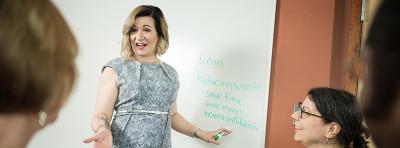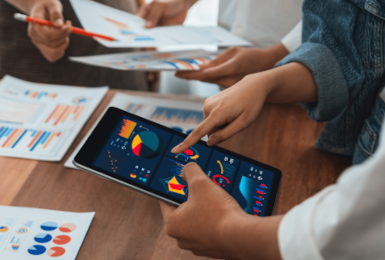We live in an increasingly digital world – more people today rely on digital media to connect and communicate. From "traditional" types of digital communication (like radio and television) to devices like computers and smartphones, digital channels are now a part of just about everything we do—and marketing is no exception.
If you're considering a career in marketing or advertising, you may have noticed degrees available in digital media and digital marketing. What's the difference between the two? And how can you decide which is right for you? Continue reading to find out.
What Is Digital Media?
Digital media refers to any content that has been created, viewed, modified, or shared digitally through audio and visual media, online advertising, email, websites, social media, and similar avenues.
Digital Media Examples
Within the overarching realm of digital media, there are a few more categories that come into play:
- Owned media – This refers to digital media content that you create and have control over, such as content you post on your social media profile or personal blog.
- Paid media – This is any type of digital content promoted through paid marketing, such as sponsored social media posts and pay-per-click (PPC) ads.
- Earned media – This refers to digital media content that others have created about you. Some examples may include a web article that mentions you or even a social media post in which you have been tagged.
Curriculum of a Digital Media Bachelor's Degree
A bachelor's degree in digital media aims to teach students how to evaluate and understand the impact various forms of digital media can have on a society’s culture and ethics. Digital media graduates should have the foundational knowledge to create, adapt, and apply digital media in business models and marketing strategies.
Most digital media bachelor's degrees are designed to be completed in about four years, with the curriculum broken up into general education, elective, and core coursework in areas such as:
- Marketing and web development
- Digital media technologies
- Essential practices in digital media
Many digital media programs also include a portfolio or capstone component that's required to graduate.
Uncovering a Digital Marketing Degree
While digital marketing is closely related to digital media, these programs are very different. Digital marketing is one component of digital media. More specifically, it refers to a specific use or application of digital media to strategically promote a brand and its services and products.
Digital Marketing Examples
There are many types of digital marketing, with some of the most common examples including:
- Search engine optimization (SEO) – Strategies used to increase a brand's search engine rankings and visibility online.
- Pay-per-click (PPC) – A form of digital advertising where businesses can pay for ad placements on websites and social media platforms. With PPC advertising, businesses are only charged for the engagements (or clicks) the ad generates.
- Social media marketing – Any form of marketing or advertising that occurs on social media, such as TikTok and Instagram.
- Email marketing – A form of digital marketing via email, usually in the form of a business or brand sending out a promotional message or offer to subscribers.
Curriculum of a Digital Marketing Bachelor's Degree
Like a bachelor's degree in digital media, a digital marketing degree is typically designed to be completed in about four years. It consists of around 120 credit hours, broken up between digital marketing core classes, general education courses, and electives.
Some examples of the topics covered in a digital marketing bachelor's degree program include:
- Marketing research and analysis
- Principles of marketing
- E-commerce management
- Analytics and analysis in digital marketing
A digital marketing degree may also include some basic business and finance courses, as well as a capstone course.
Learning Outcomes of Both Degree Programs
There is some overlap between a digital marketing and a digital media degree. Some of the learning outcomes are similar as well. However, the applications for each program may vary depending on your path.
Developing Content Creation Skills
Crafting compelling and engaging content is vital to working in digital media or digital marketing. Many people with these degrees go on to work as content marketing strategists, where they help businesses create and execute their content creation plans, conduct competitor analysis, handle editorial planning, and much more.
Data Analysis and Strategic Thinking
Working in the digital marketing or digital media fields also means processing and interpreting large amounts of data to make informed decisions about content strategies and marketing plans. In a bachelor's degree program, you can expect to sharpen your data analysis and strategic thinking skills with targeted coursework. In digital marketing, making informed decisions based on marketing data can make all the difference in a campaign's success.
Technical Savvy
The digital media and digital marketing world is inherently tech-heavy. To find success in either of these paths, you'll need to be relatively tech-savvy and confident using a wide range of technologies, including some technologies you may already be comfortable with (such as smartphones and social media) as well as some you may be less familiar with (such as machine learning and artificial intelligence).
Staying abreast of the latest digital trends and technologies and adapting your skills can help you remain competitive in this dynamic field.
Audience and Consumer Behavior
Being able to study and analyze audiences and consumer behaviors is another crucial outcome of any digital marketing or digital media program. In both digital media and marketing, content must be heavily tailored to meet a specific audience's needs to be effective, so having these abilities will take you far in these competitive career paths.
Careers for Digital Media and Digital Marketing Graduates
There's a lot you can do with a digital media or digital marketing degree, depending on your interests and professional goals.
Potential Job Industries
People with digital marketing or digital media degrees often go on to work in such positions as:
- Digital marketing specialist
- Digital advertising manager
- E-commerce manager
- Search engine optimization specialist
- Search engine marketing manager
- Social media specialist
- Marketing analyst
- Data analyst
- Web designer
- Brand associate
- Content marketing specialist
- Public relations specialist
Both digital media and digital marketing fields are expected to grow in demand in the coming years. According to the Bureau of Labor Statistics (BLS), the job outlook for the category of “Advertising, Promotions, and Marketing Managers” is expected to grow 6 percent through 2032, which is faster than the average for all occupations (3 percent).
Salary Expectations
The salary for a digital media or digital marketing graduate can vary greatly depending on several factors, including the degree you complete and the job title you end up with. However, there is the potential to make good money in these fields, especially as you develop your work experience and expertise.
According to the BLS, the median pay for “Advertising, Promotions, and Marketing Managers” in 2022 was $138,730 per year.
Making Your Decision: Digital Media or Digital Marketing?
So, which degree program is right for you, digital media or digital marketing? Ultimately, it boils down to where your interests lie and what you see yourself doing after graduation. If you're more interested in the advertising and marketing side of things, then a degree in digital marketing may be best for you. However, if you're more interested in digital media as a whole and the many ways in which it can be used (aside from just marketing), then a digital media degree may be the better option.
Pursue Your Passion With Champlain College Online:
A career in digital marketing or digital media can be both rewarding and impactful. Champlain College Online offers flexible, fully online bachelor’s degree programs to help you achieve your goals. Explore our digital marketing degree online or digital media program — both can be completed in as few as 14 terms, with multiple start dates to fit your schedule.
Learn more about our digital marketing and digital media programs by reaching out today. If you're ready, you can also fill out your free application online in a matter of minutes.
Frequently Asked Questions
Is Digital Media Part of Marketing?
Yes, both fields are closely related—you can't realistically have one without the other. Digital media is a specific field that analyzes how digital platforms can be used to communicate, create, and share ideas. Understanding different forms of digital media is essential to marketing, as marketers need to use these avenues to reach their audiences in any campaign.
What Is the Difference Between Digital Media and Digital Marketing?
While digital media and digital marketing are undoubtedly similar, some key differences exist. Mainly, it's important to understand that digital media refers to the content that is created, shared, and distributed using forms of digital communication. Digital marketing, on the other hand, refers to the marketing and advertising strategies used to promote a product or service.
What Are the Benefits of Digital Media in Marketing?
Having a solid understanding of digital media in its various forms and how to create compelling media is critical to the success of any digital marketing campaign. For example, you can't expect to create an engaging social media marketing campaign without first understanding how people already use social media to communicate, share ideas, and engage with each other.
What Is Digital Marketing?
Digital marketing refers to the strategies used to promote a specific product or service. It can also be used to generate brand awareness or build a brand's overall reputation. Digital marketing can be carried out through any number of methods, including search engine optimization, paid advertising, email marketing, and content marketing.
Request Information
Connect with our admissions team to learn more about Champlain College Online today.

Request Information
I acknowledge that, by clicking the "submit" button, I am giving my express written consent to Champlain College and its representatives to contact me about educational opportunities via email, text, or phone, at the phone number above, including my mobile phone, using an automatic dialer, or pre-recorded message. Message and data rates may apply. I understand that my consent is not a requirement for enrollment, and I may withdraw my consent at any time.






